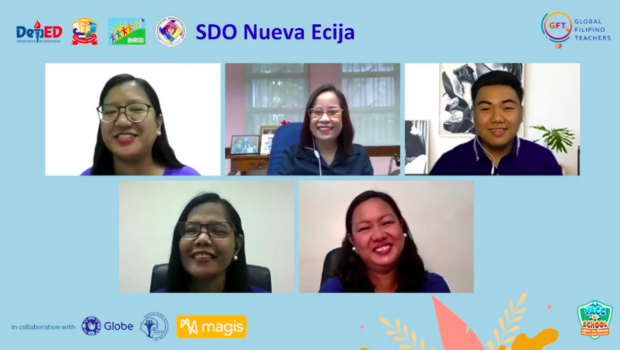
Resilience is the ability to bounce back from misery or hardships, and Filipinos have been lauded as a resilient nation in the face of crisis and adversity. This valuable trait was the main focus of the sixth edition of Globe and the Department of Education’s (DepEd) webinar series, TAYO Naman! (Tulong, Alaga, Yakap at Oras para sa mga Tagapagtaguyod ng Edukasyon) titled “Resilience Through Positive Psychology – Emerging and Keeping Up with Adversities.”
“Resilient individuals not only recover stronger from a crisis but often also find meaning in the experience. They are able to make sense of the hardship. Tipong kaya pala nangyari ito, at ito ay nagagamit nila para harapin ang mga susunod na dagok ng buhay,” said Dr. Carolina Uno-Rayco, Ph.D., RGC, RPsy, National Executive Director of the Philippine Mental Health Association.

(Upper boxes) from L-R
Maria Luisa Gamino – Project Development II, SDO Nueva Ecija, Dr. Carolina Uno-Rayco, RGC, RPsy – National Executive Director, Philippine Mental Health Association, John Darryl Caysido – School DRRM Coordination, Teacher III, Marawa Elementary School, SDO Nueva Ecija
(Lower boxes) from L-R
Elizabeth Sibayan – Public Schools District Supervisor, Gabaldon District, SDO Nueva Ecija
Maria Lourdes Ramirez – Secondary School Principal II, NEHS – Senior High School, SDO Nueva Ecija
Dr. Uno-Rayco discussed how educators can cultivate resilience in themselves and also tackled the different factors that can affect their mental health during the pandemic.
She highlighted the role of using Positive Psychology in developing resilience. She explained that positive psychology is the study of happiness and optimal functioning and it helps individuals, communities, and societies thrive and flourish.
“Positive psychology is highly connected with resilience because when we talk about resilience, we talk about resistance and recovery from distress. We cannot stay long with the negative feelings that go with stress or disasters in our lives,” she said.
She added: “Ang mga taong resilient alam nila na may kahirapan, may trahedya, may kaguluhan, but they are optimistic. Iniisip niya na ang nangyayaring difficulty ay hindi permanente. Ang negative experience ay hindi nakakaapekto sa kabuuan ng buhay niya. Alam niya na bad things happen, but good things also happen.”
However, Dr. Uno-Rayco pointed out that resilience is not about toxic positivity, which is the denial that negative emotions exist and should not be felt.
Human beings, she emphasized, are both capable of feeling positive and negative emotions, but all emotions are fleeting. She advised everyone to keep things in perspective, “live, grieve, be happy, be sad, but still have a meaningful existence. We must be able to ride the peaks and lows of our emotions.”
Dr. Rayco ended her lecture by giving the audience four strategies on how to develop resilience:
- Increase positive emotions through the practice of gratefulness;
- Strengthen relationships and develop a support system of friends and loved ones;
- Create meaning out of negative experiences by having the power to choose whether the meaning gives hope or causes sadness; and
- Think of things that one has control over, focus on thoughts that would cause less sadness and anxiety, and tune out those that are not helpful.
The second half of the session featured panelists from the Schools Division Office (SDO) of Nueva Ecija and was facilitated by Project Development Officer III Maria Luisa Gamino. Panelists were Teacher John Darryl Caysido, Public Schools District Supervisor Elizabeth Sibayan, and Secondary School Principal Maria Lourdes Ramirez. The webinar was hosted by Mr. Jeffrey Aquino, and Master Teacher, Marichelle Pagaragan.
TAYO Naman! is an online Mental Health and Psychosocial Support program designed to help teachers, non-teaching personnel, and parents learn about self-care, wellness, and resilience.
The 14-part webinar series is led by the DepEd Disaster Risk Reduction Management Service (DepEd-DRRMS) and the Bureau of Human Resource and Organizational Development-Employee Welfare Division (BHROD-EWD) in collaboration with Globe’s Global Filipino Teachers Series on Psychosocial Support Services, Philippine Mental Health Association, and MAGIS Creative Spaces.
The webinars are held every Friday until August 20, 2021, from 8:30 to 10:00 am and streamed live on DepED Philippines, DepEd DRRMS, and Globe Bridgecom. The next session will focus on “Practicing Mindfulness to Manage Stress” on July 2.
The company strongly supports the United Nations Sustainable Development Goals, particularly UN SGD No. 3 on good health and well-being and UN SDG No. 4 on inclusive and equitable quality education for all. Globe is committed to upholding the 10 United Nations Global Compact principles and 10 UN SDGs.
To know more about Globe, visit https://www.globe.com.ph/about-us/sustainability.html.

